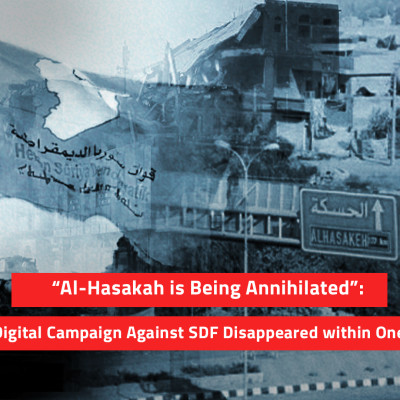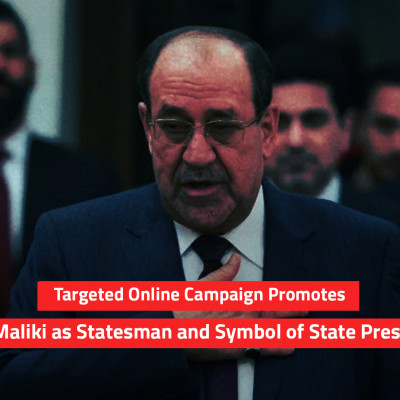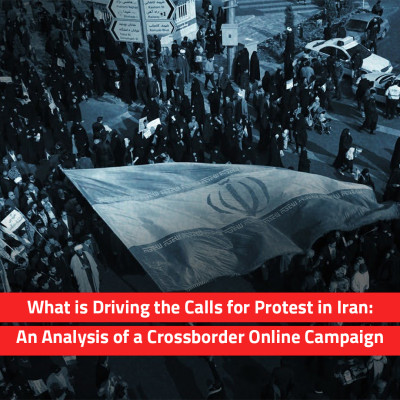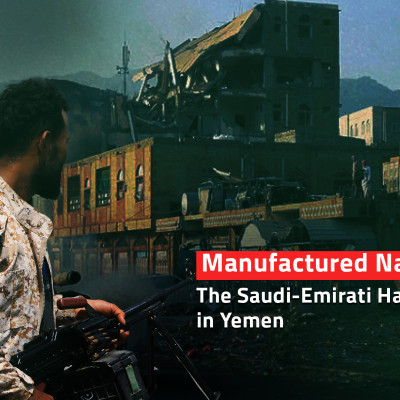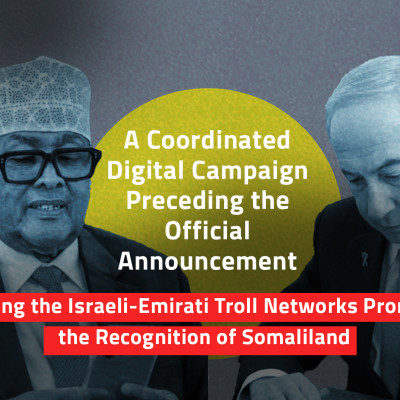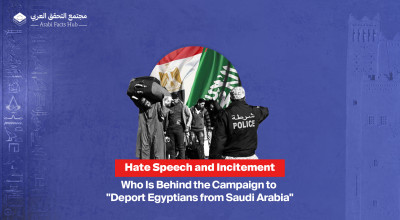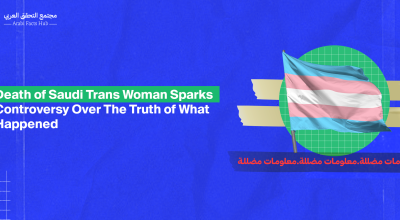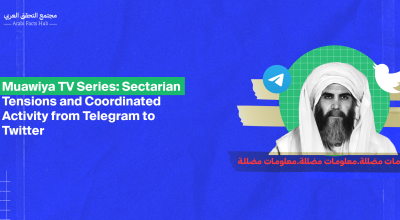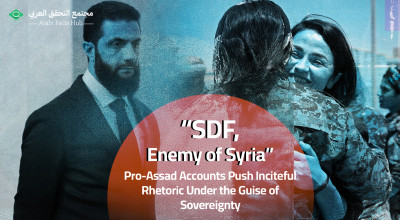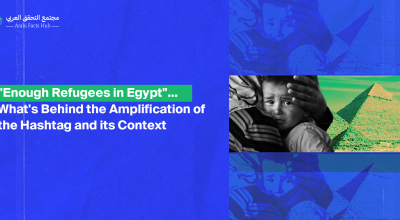“Awareness Egypt”: Enemies of Immigrants, Afro-Centrism, and Alaa Abdel Fattah
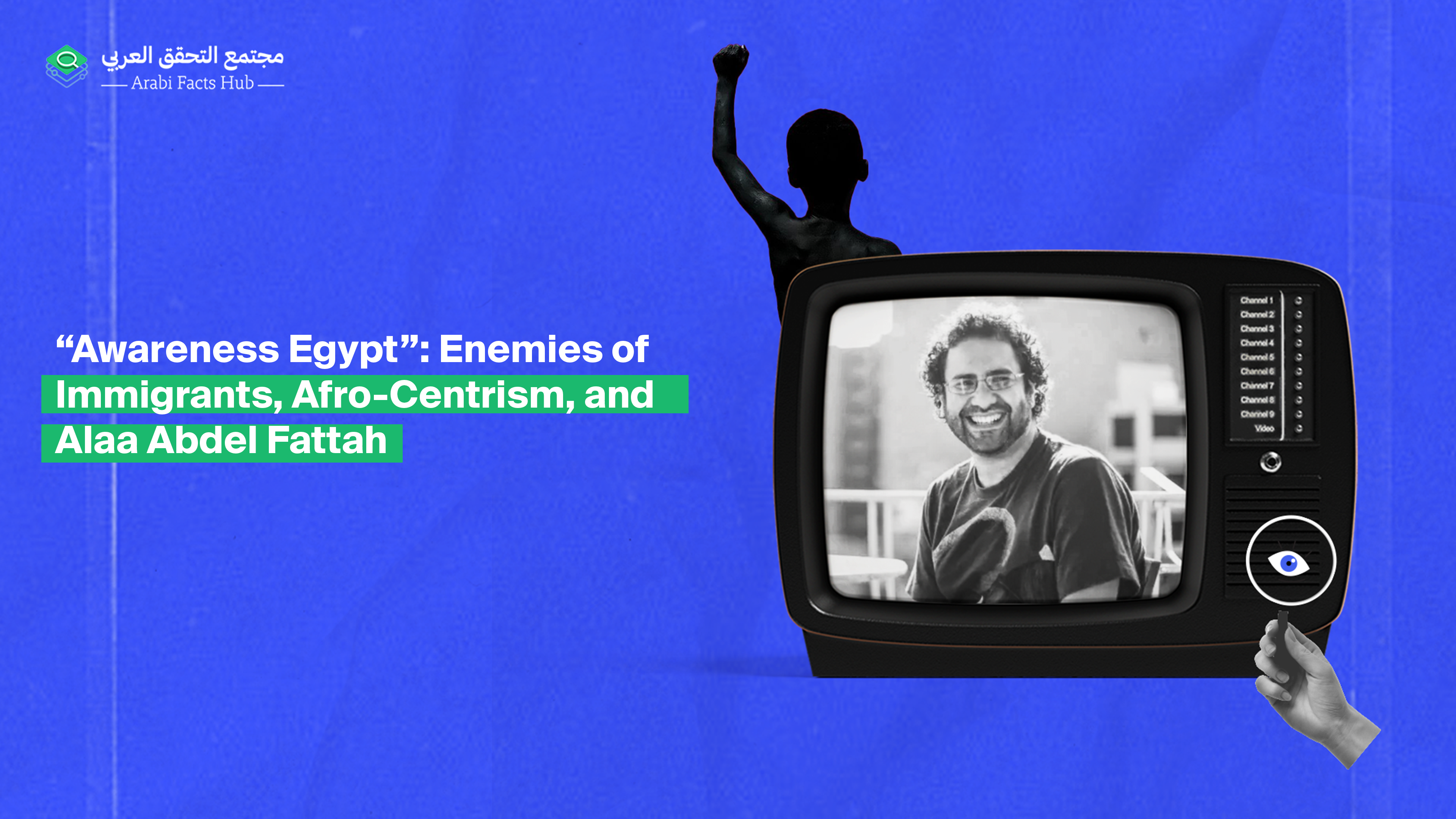
This is part of a series of investigative reports published in collaboration with Daraj media
The page called "The Heart of the Egyptian National Awareness Project" does not tweet alone. It is part of a group of at least 15 nationalist pages, connected to eight groups that act as support for these pages, forming a base for their online campaigns and activities.
______________________________________________________________________________
While Western countries witness extremist right-wing campaigns against refugees and migrants fleeing their countries due to wars and living conditions, or to pursue their dreams, anti-foreign campaigns have emerged in the Middle East, based on a chauvinistic discourse.
Deteriorating economic and social conditions in the region contributed to the rise of nationalist groups advocating for racial purity. Their discourse often covers up the failure of governments to fulfill their duties. These groups repeatedly accuse refugees of putting pressure on the economies of the host countries, which have become major gateways to Northern Europe.
In Egypt, for example, campaigns against migrants and refugees have escalated in recent years, propagated by groups with a similar rhetoric. Some of these groups have later become part of coalitions supporting the policies of the president and the government. One such group is "Awareness Egypt;" a group with a nationalist, anti-black and anti-refugee discourse. It has expanded its coordinated campaigns to engage in political campaigns aimed at tarnishing and attacking activists and government critics.
The Tunisian Example: Why “Awareness Egypt”?
In November of 2022, a small party in Tunisia initiated a petition campaign calling for the expulsion of immigrants coming from sub-Saharan Africa. The campaign included knocking on the doors of state and municipal officials, and rallying them against the presence of African immigrants. Campaigners warned against alleged colonization plans that aimed to change the demographic composition of the country, drawing comparisons to the actions of Israelis in Palestine. Campaigners also incited against the practice of Christianity by some immigrants. They urged regional leaders and citizens to prioritize Muslim immigrants over Christians.
Four months later, Tunisian President Kais Saied echoed the same discourse, stating that the influx of "hordes of irregular immigrants from sub-Saharan Africa" to Tunisia leads to "unacceptable violence, crimes, and practices." Saied said that this is an "abnormal situation" that has “criminal intent.” Its purpose, he added, is to “change the demographic composition,” ultimately transforming Tunisia into "an exclusively African state, with no affiliation to either the Arab or Islamic worlds."
These statements caused a state of panic within the refugee community in Tunisia, with some reporting incidents of violence, harassment, and attacks they had experienced. In response, African countries sent planes to repatriate their citizens. The African Union condemned the hate speech used by the Tunisian president.
Ironically, the narrative of colonization and demographic change has been adopted by Egyptian nationalist groups, including Awareness Egypt. The group cited Tunisia as an example and claimed the existence of a "Black Zionist movement," a narrative echoed by other Egyptian nationalist pages that welcomed Saied's discourse.
The repetition of the same pattern, discourse, and methods, along with the potential risks it carries, prompted us to try to learn more about Awareness Egypt
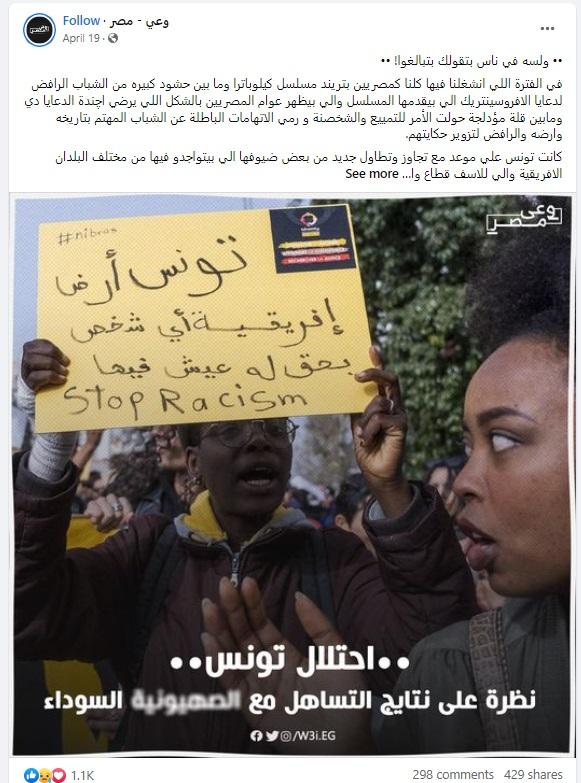
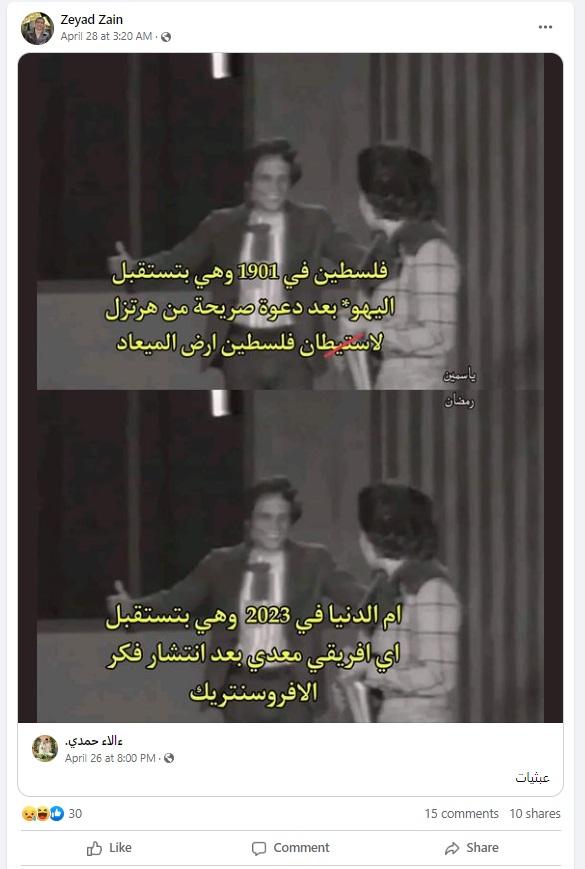
What is Awareness Egypt?
On February 1, 2022, a Facebook page named Awareness Egypt emerged, showcasing its activity in supporting cyber campaigns to exert pressure on officials and disseminate an atmosphere and discourse of hatred against the presence of migrants and refugees in Egypt, in a manner that resembles the discourse of far-right movements in Europe.
The page, self-identified as the "Heart of the Egyptian National Awareness Project," does not operate in isolation. It is part of a network of at least 15 nationalist pages, connected to eight groups that act as support for these pages, forming a base for their online campaigns and activities.
In addition to Awareness Egypt, these groups coordinate with each other, exchanging content and coordinating their attacks. The groups are known for their recurrent hate speech and have played a prominent role in campaigns against refugees and migrants.
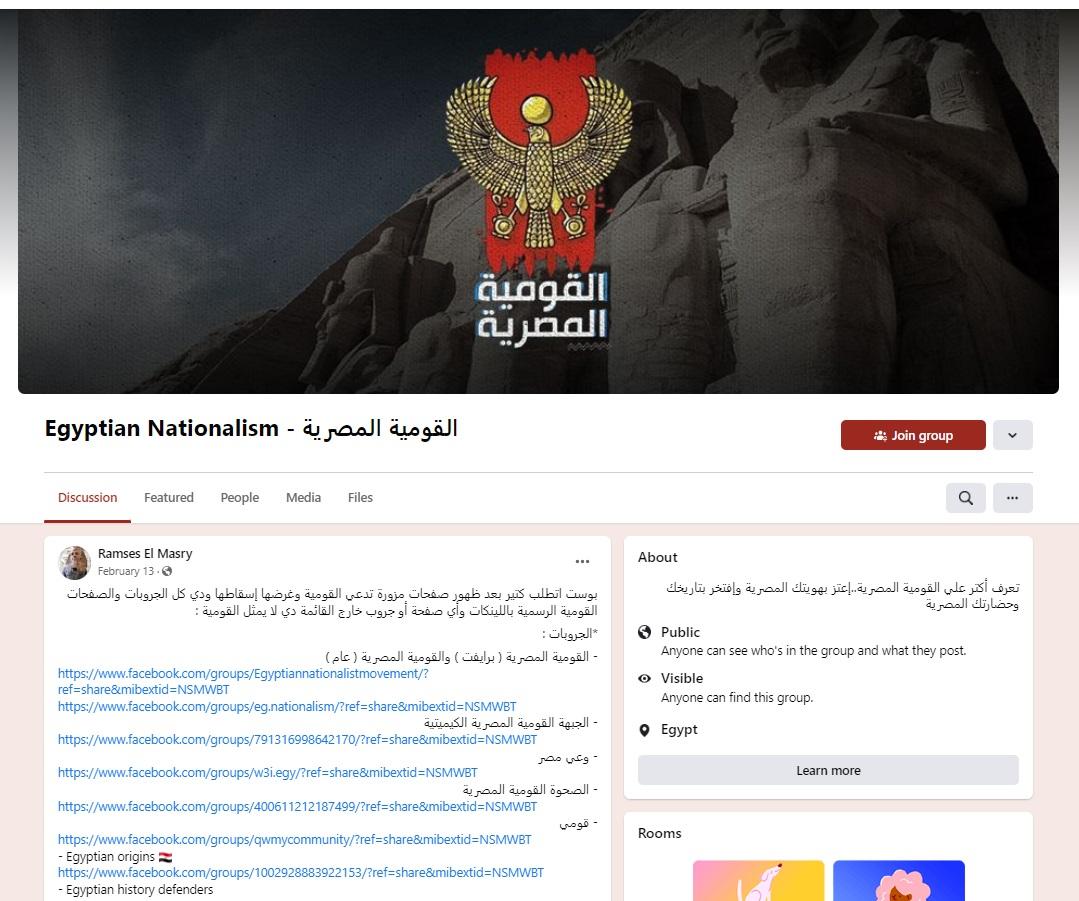
The early days of the page's appearance, which witnessed intensive activity, and high-quality graphics and designs, indicate thorough preparation. It seems not to be a spontaneous creation. This possibility is confirmed by the existence of a closed group on Facebook bearing the same name as the page. The group is managed by the influential and founding members of the Awareness Egypt page, and it has 8,588 members. The group predates the page by three years, as it was created on April 7, 2020.
The group identifies its goals as "spreading awareness and establishing the ideas and principles of Egyptian nationalism," "disseminating positive news and constructive criticism of the shortcomings," and "emphasizing allegiance to the Egyptian state, and fully supporting its institutions."
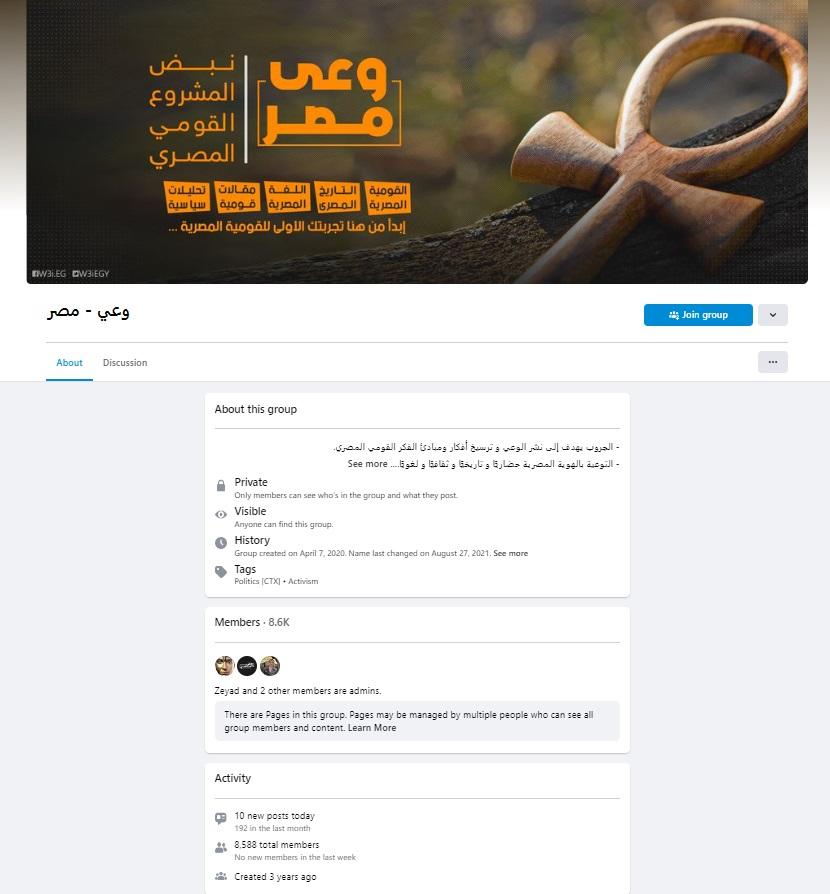
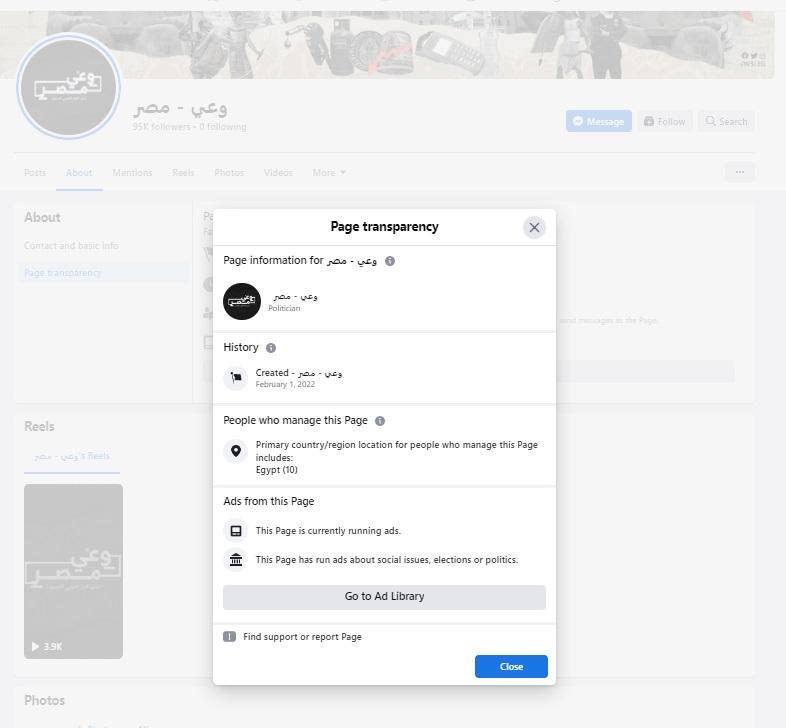
According to Facebook's transparency feature, the page is managed by 10 individuals from Egypt, which indicates that it is not a random activity. Since its creation until May 25th, the page has garnered 1.10 million interactions, with a monthly average of 72.2 thousand interactions, according to the "CrowdTangle" tool owned by Meta.
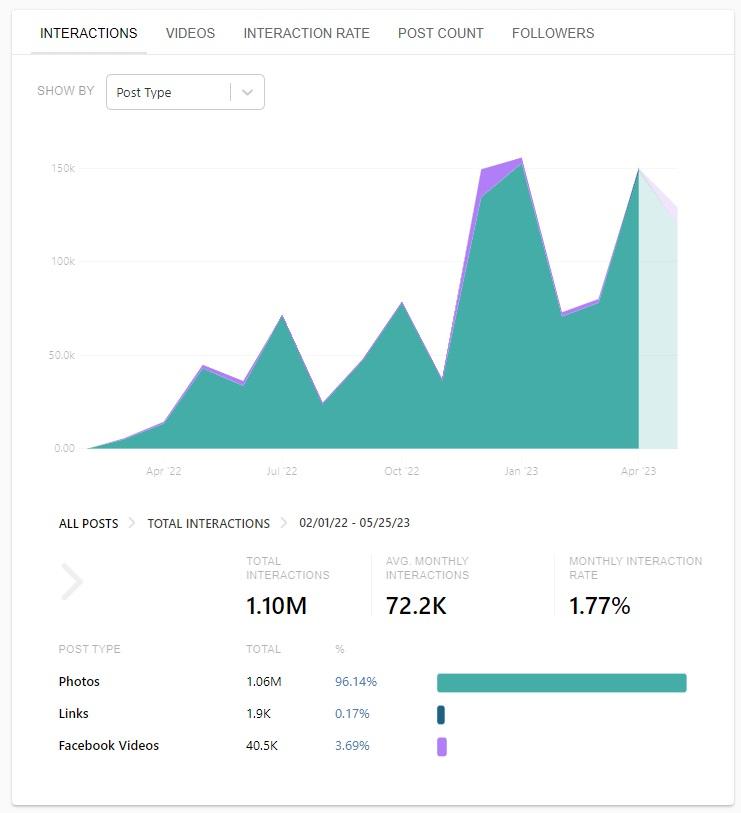
An illustrative diagram of the activity periods of Awareness Egypt page and the overall interaction scene – CrowdTangle tool
Images constitute 96.14% of the total interactions garnered by the page, reflecting its heavy reliance on visuals and illustrated designs accompanying its lengthy textual posts. Interactions with the page’s images peaked last January, reaching 152,631 interactions.
Since its launch, Awareness Egypt posted 1,300 times, with an average of 79 posts per month. Out of these posts, the page shared 59 videos, accounting for 3.69% of the total interactions. The page's videos accumulated a total of 407,000 views, with approximately half of them (192,824 views) occurring in December 2022.
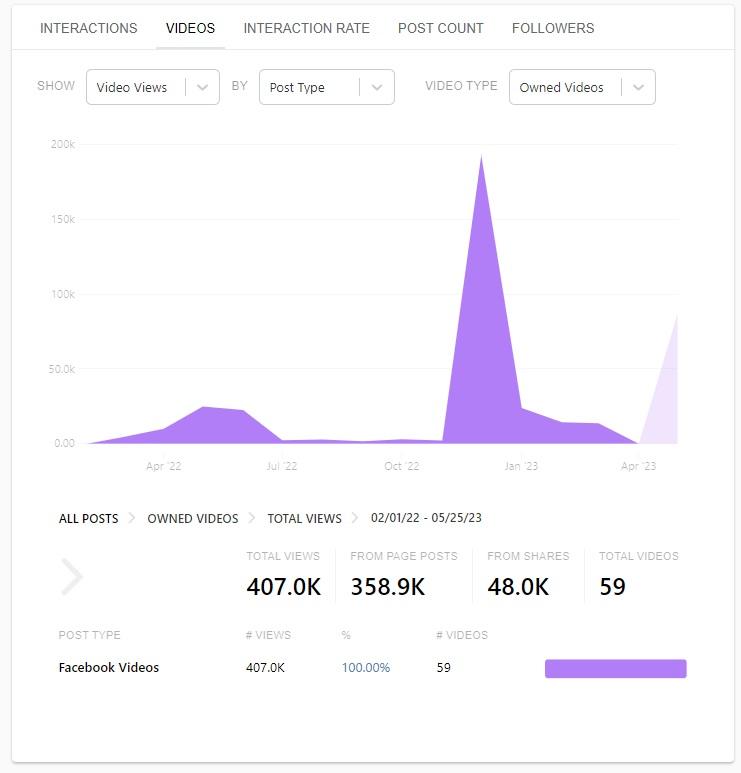
An illustrative diagram of Awareness Egypt page’s videos – CrowdTangle tool
The group doesn't just own one page on Facebook. Rather, it owns and operates Awareness Egypt, Awareness Egypt Platform, the Egyptian Nationalism Private Group, E G Y P T I A N 𓂀 group, and the "E G Y P T I A N ☥ A R T" group. It also has a virtual presence on Twitter, Instagram, and YouTube, but its largest presence is on Facebook, both in terms of groups and the main page, which has over 95,000 followers.
The page relied on paid advertisements for some of its posts to promote and amplify its presence. We found at least three advertisements, with the latest launched on May 24th. Two of them used Instagram, as shown in the advertising data from Meta (formerly Facebook). The advertising library only provides a quick overview of Instagram ads, possibly because Awareness Egypt's last advertisement on Facebook is quite recent. Each Instagram ad targeted an audience range of 100,000 to 500,000 people. This took place between December and January.
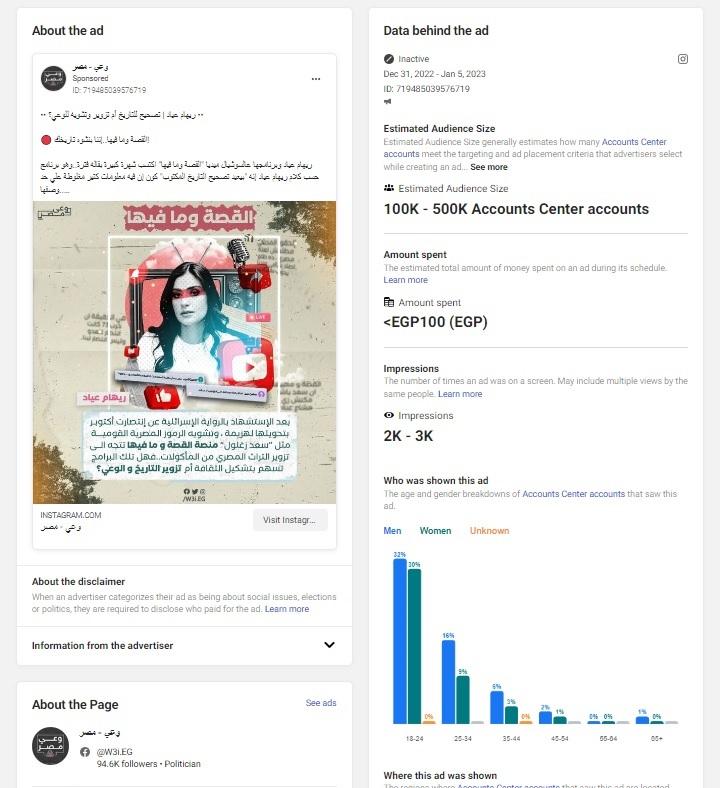
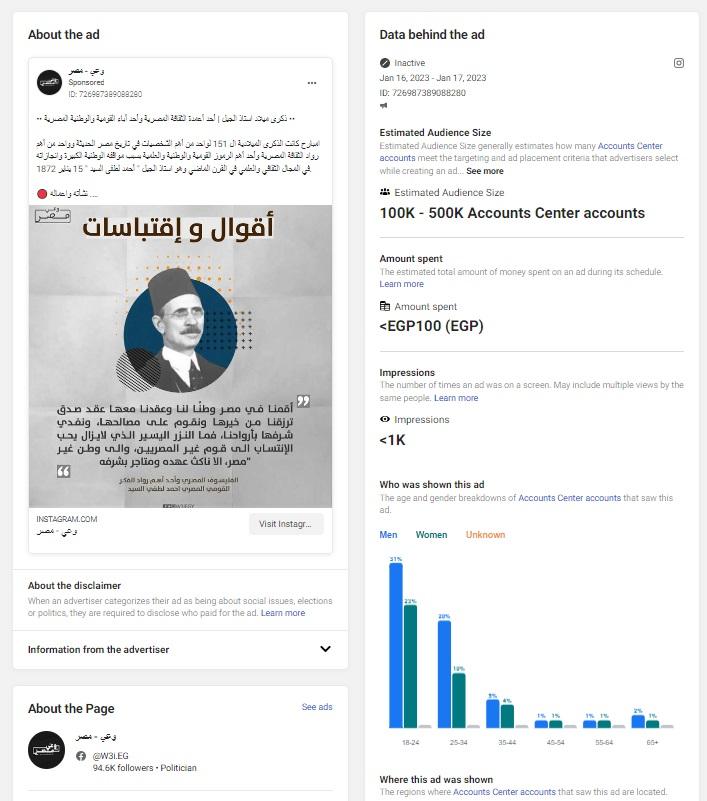
Two screenshots of advertising data for the Awareness Egypt page on Instagram – Meta Advertising Library (Facebook).
Upon clicking on the advertisements, Instagram informs us that the Awareness Egypt account is not available because it may have been removed. It is unclear whether this removal was initiated by the group's administrators or by the network itself. The majority of viewers for both advertisements were in the age groups of 18-24 and 25-34, with the majority (in order) from the governorates of Cairo, Dakahlia, Alexandria, Giza, Gharbia, Sharqia, and Menoufia.
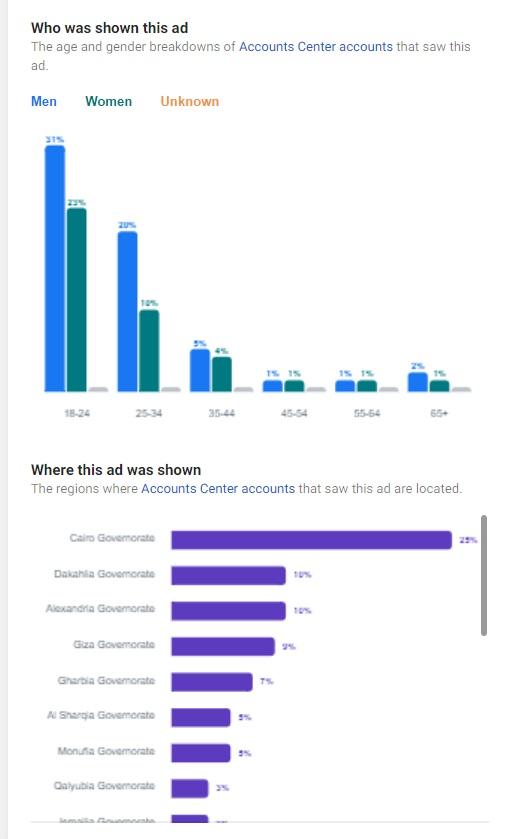
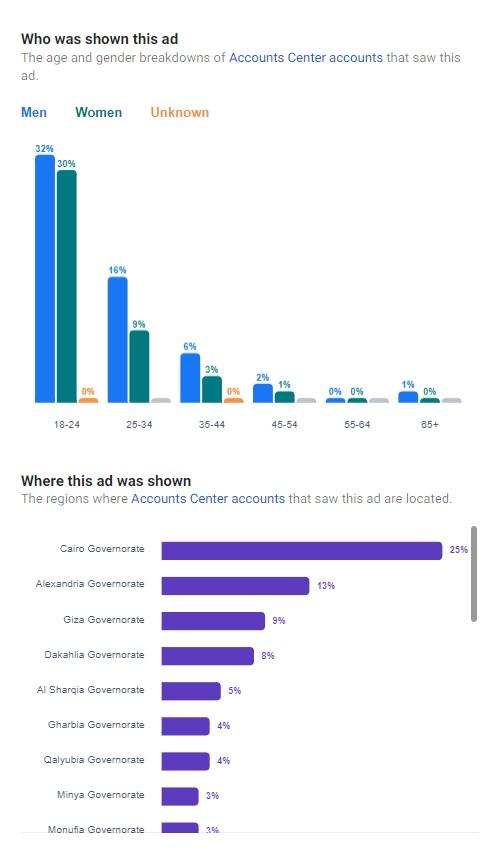
Illustrative charts for age groups and the governorates most exposed governorates to Awareness Egypt advertisements – MetaData Library (Facebook).
Awareness Egypt is not the only group using Facebook ads to increase the reach of its posts. In the image below, from Meta's Advertisements Library, we found eight ads for the Nationalist Awakening group, the latest of which was on May 23rd, with some aiming to reach one million people. The recent spread of some of these posts on social networks may be attributed to these advertisements. All the posts revolve around controversial issues. Posts claim the purity of the Egyptian race based on unreliable studies, and emphasize the "threat" posed by the Afrocentric movement to Egyptian identity and ancient Egyptian civilization.
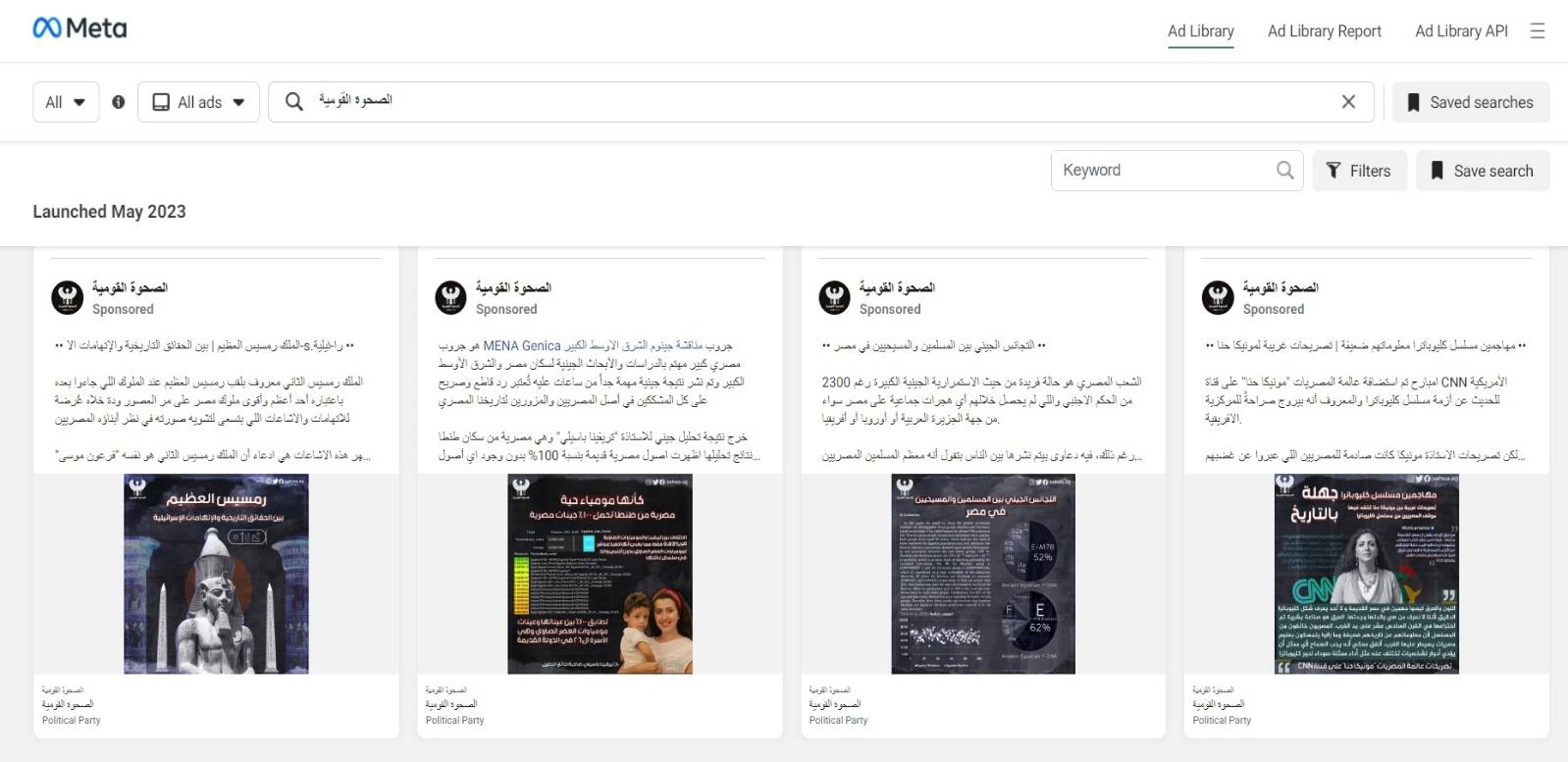
Two posts from the aforementioned ad image caused a stir on social networks. The first contains unreliable claims not supported by conclusive evidence, stating that a genetic test showed Trivina Basil, an Egyptian citizen from Tanta currently living in Australia, to be 100% similar to ancient Egyptian mummies with no African or foreign origins. This information was disseminated by the Awareness Egypt group and amplified by the Nationalist Awakening group.
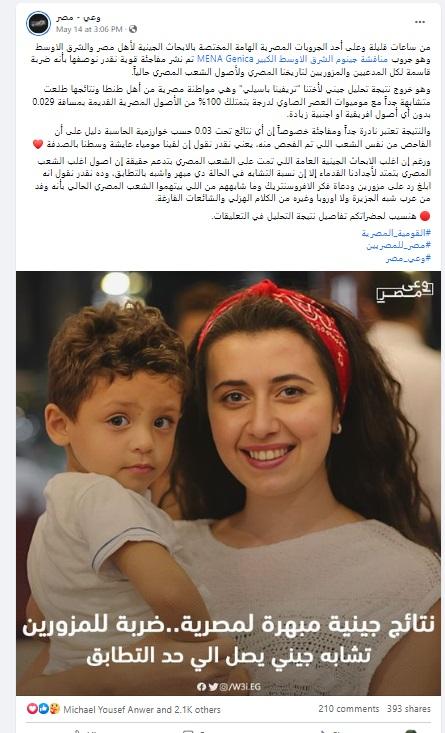
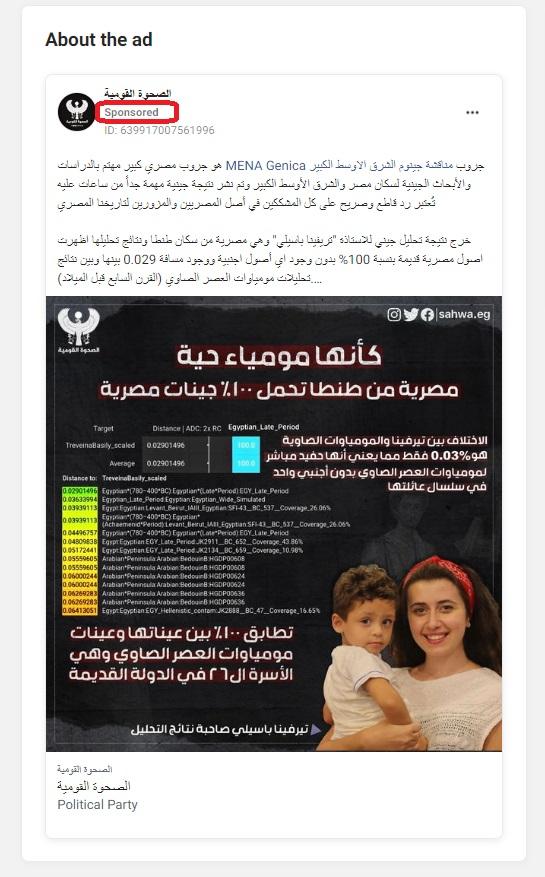
With the advertisements and amplification, talk about the alleged analysis spread quickly. Within days, Egyptian television programs hosted a citizen named Mohamed Abdelhadi and another individual who presented himself as an "engineer" but expressed an interest in genetic sciences.
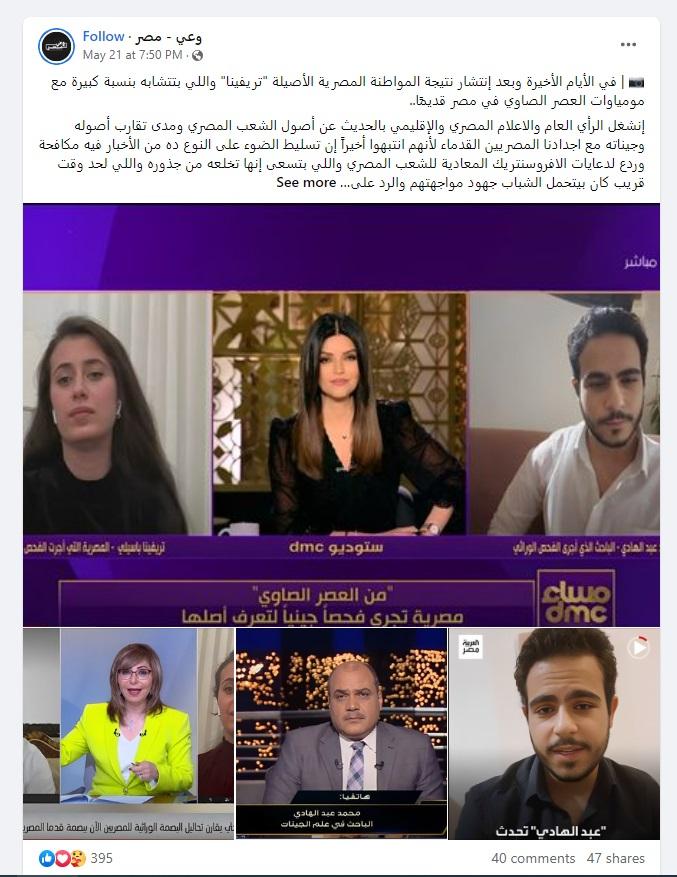
These programs did not host subject matter experts or representatives of opposing views that are expressed on social media platforms. The second sponsored post, from the Nationalist Awakening group, was linked to the first due to verbal clashes between the alleged expert (Abdelhadi) and others in the virtual space who doubted his claims. Among them was Monica Hanna, a professor at Aswan University’s Faculty of Archaeology and Cultural Heritage.
Hanna criticized Abdelhadi's claims, stating that there are African origins extending to the population of Egypt. The debate extended to the Netflix series and its black skinned protagonist who plays Cleopatra. Nationalist pages responded to Hanna's by waging a series of ad hominem attacks. Additionally, they decontextualized parts of her interview with CNN about the African genetic influences on Egyptians, accusing her of supporting Afrocentrism.
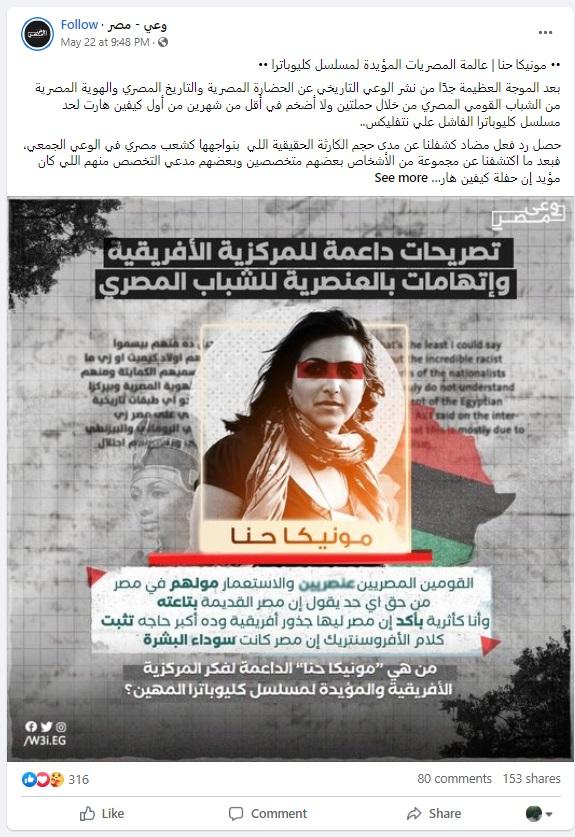
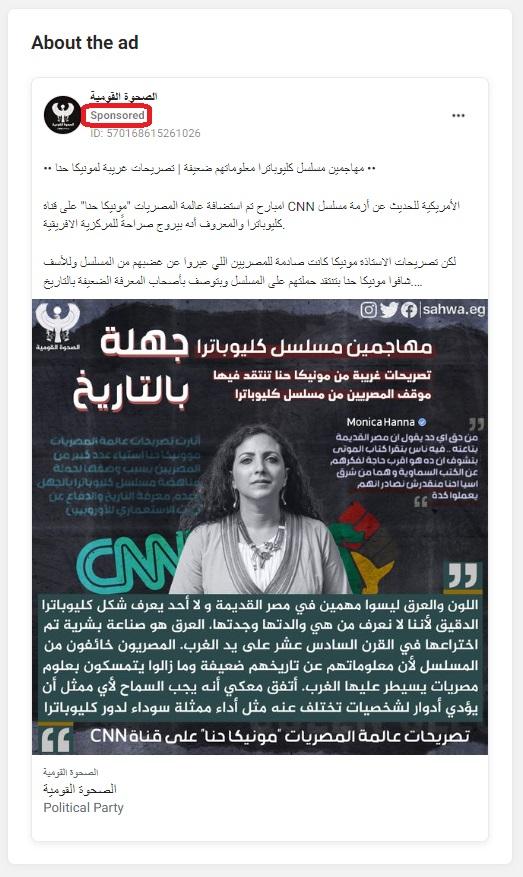
Who runs Awareness Egypt?
Awareness Egypt is associated with an individual named Zeyad Zain, who presents himself as the founder of the group. The name is mentioned in reports from Egyptian and Arab media studying the group's campaign against both Afrocentrism and Kevin Hart’s show in Egypt. A search for Zein reveals that he lives in Alexandria, and that he completed his secondary school (with a concentration in science) with a score of 72% in 2019. He then studied at the Faculty of Commerce at the University of Alexandria, as indicated by his interactions and data in an unofficial group for newcomers to the college in the academic year (2019-2020).
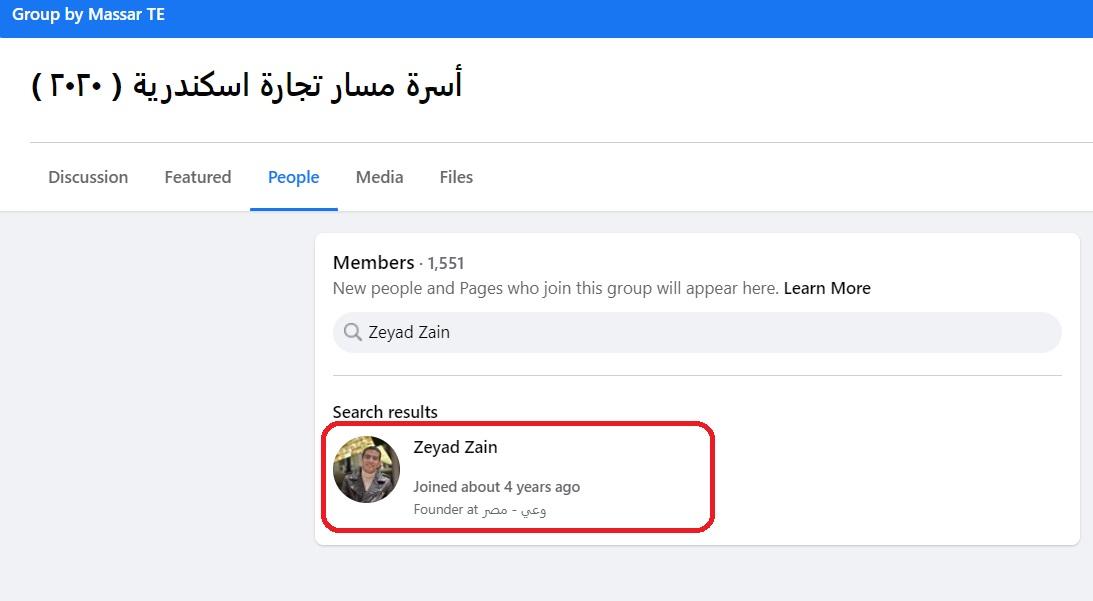
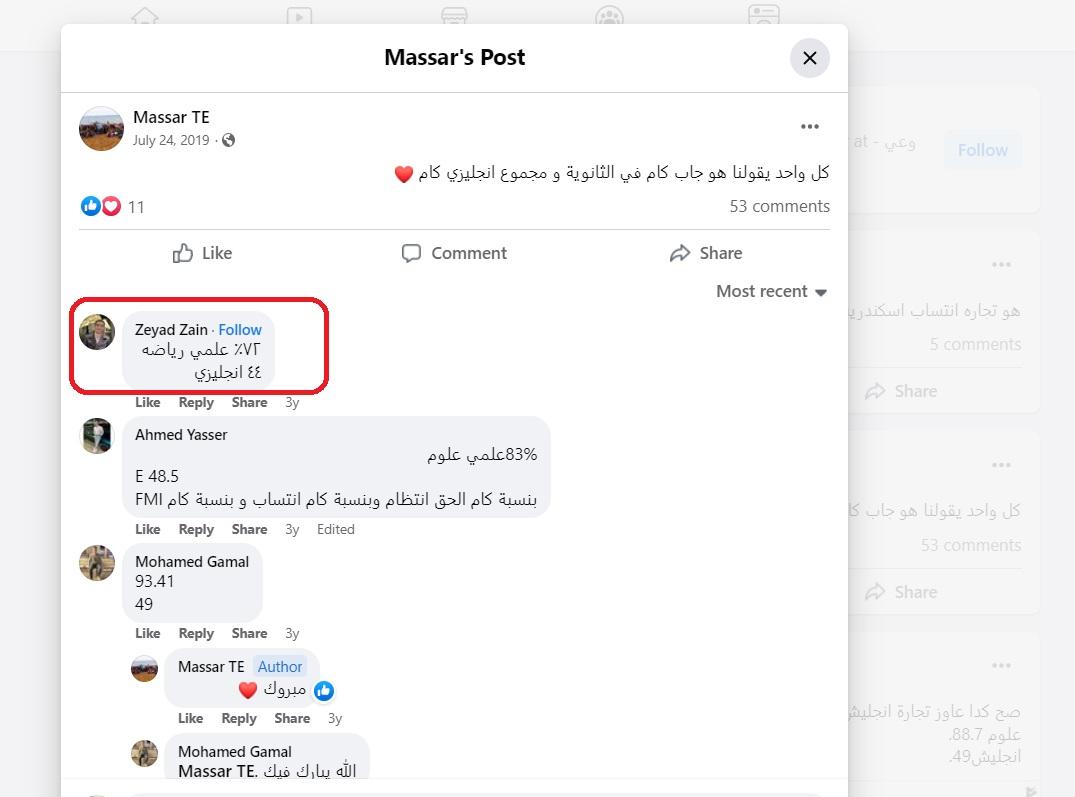
Some posts from Awareness Egypt express support for the Egyptian president and his government. Years before the page was created, however, its founder mocked the “bald guy asking me for something for Egypt."
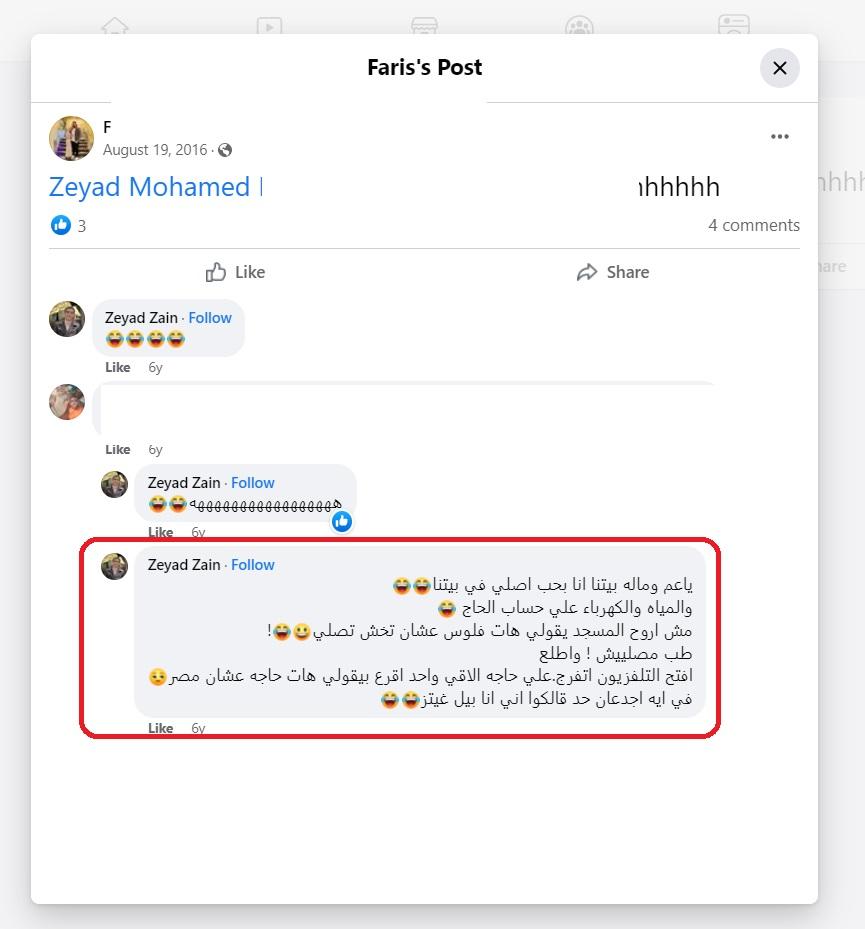
It is unknown if the young man in his twenties went through an acute turning point. But his later personal posts reflect support for the president's policies, and are critical of his opponents. The posts also criticized the era of Hosni Mubarak.
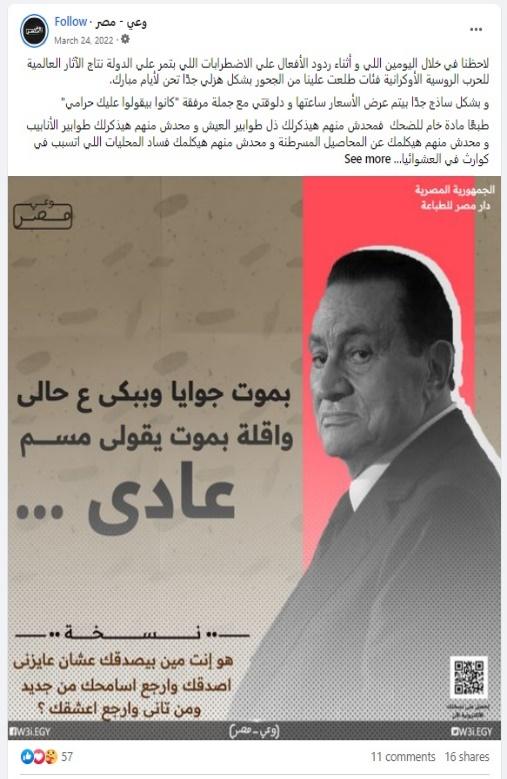
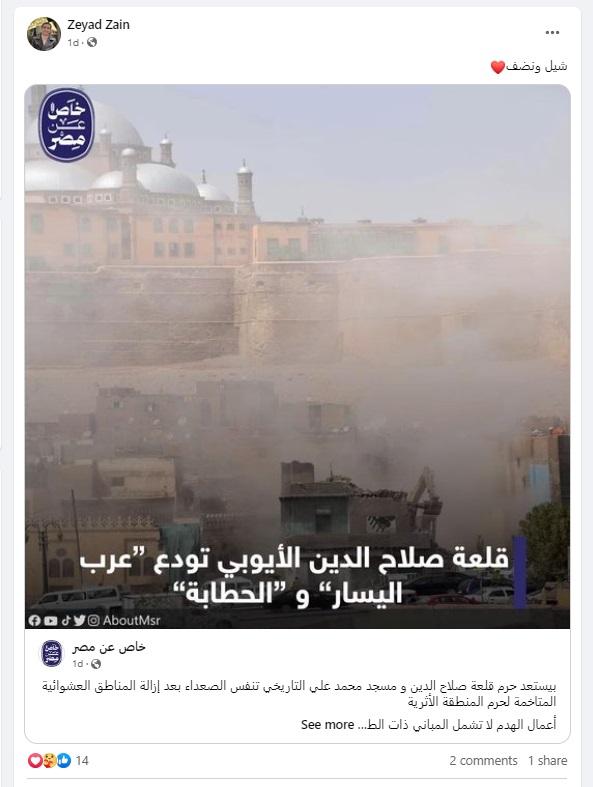
On April 27th of last year, Zain wrote a post marking a year and a half since the launch of the Nationalist Awareness Project and its core page Awareness Egypt through "self-efforts." He added that the total number of followers on the project's platforms is 400,000 followers across all platforms, although the total observed on well-known platforms associated with him does not indicate such a large number. Moreover, the total number of views became "over a million views on all videos," while Crowd Tangle's data (407,000 views) puts into question the accuracy of the numbers provided by Ziad.
In the same post, Zain referred to a friend named Abdelrahman ElMorshedy who partook in this project. ElMorshedy studied in the history department at the Faculty of Arts, Cairo University. His interactions reveal that he plays an important role in designing the images accompanying Awareness Egypt’s posts and writing the posts themselves.
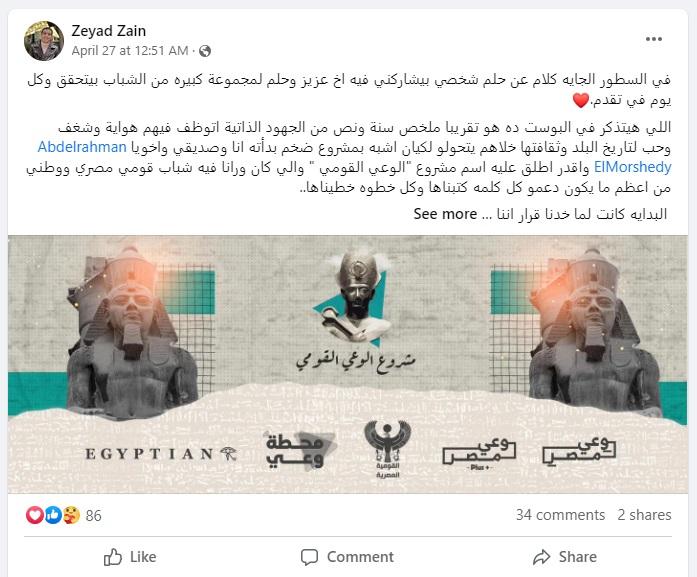
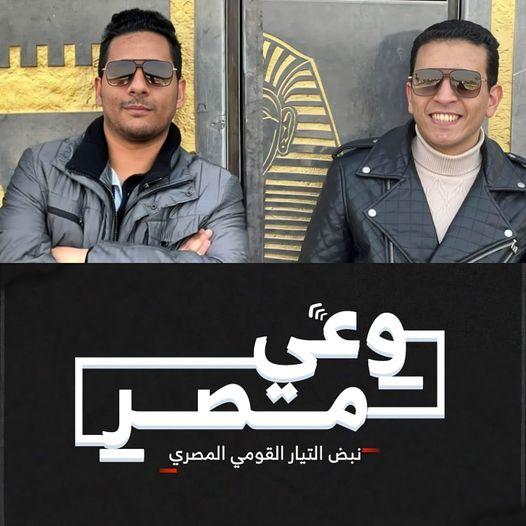
A certain Mohamed Tarek takes responsibility for the "Awareness Egypt +" page, created by the main group as a backup page after the main page faced disruptions due to reports by individuals. There are others operating other platforms of the group that are active in preparing and presenting video clips.
Interactions indicate the involvement of other individuals, especially "nationalist" designers, in transient activities across nationalist pages including Awareness Egypt.
Knocking doors: in pursuit of official and parliamentary backing
In a manner resembling the approach of the Tunisian Nationalist Party, Zain and ElMorshedy sought to communicate with government officials. In doing so, they emphasized different messages, from hostility towards immigrants, to nationalist ideas, and defending Egypt against the "threats" of Afro-centrism.
On one occasion, the duo met with Mustafa Ezzelarab, the Assistant Minister of Youth and Sports for Cultural and Social Development, expressing gratitude for his constant support. The meeting was preceded by a post when Ezzelarab assumed his position, and later there were at least two posts containing statements aligning with the group's discourse.
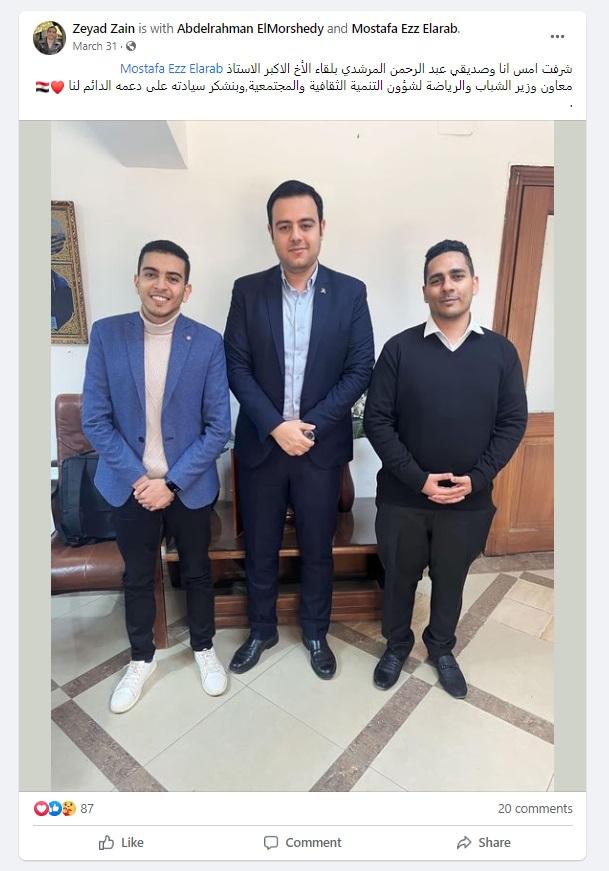
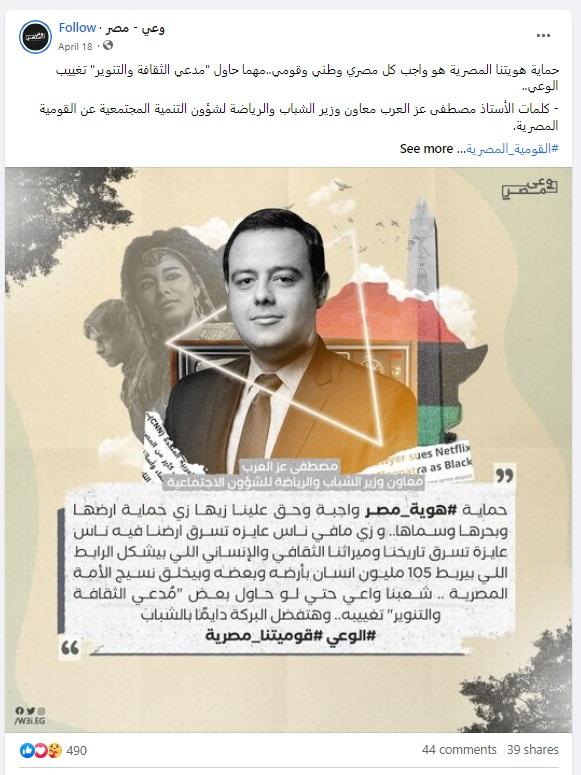
Awareness Egypt announced that, “as part of the campaign of Egyptian nationalists for dissemination and awareness, we recently published the first issue of the Safir online magazine at Alexandria University’s Faculty of Economic and Political Science. The theme of the issue was Afro-centrism as a threat to Egyptian national security.
At that time, Zain mentioned Tarek, who studied at the college. "Thank you for your efforts," his post read, indicating a role he might have played in promoting these topics to the college magazine.
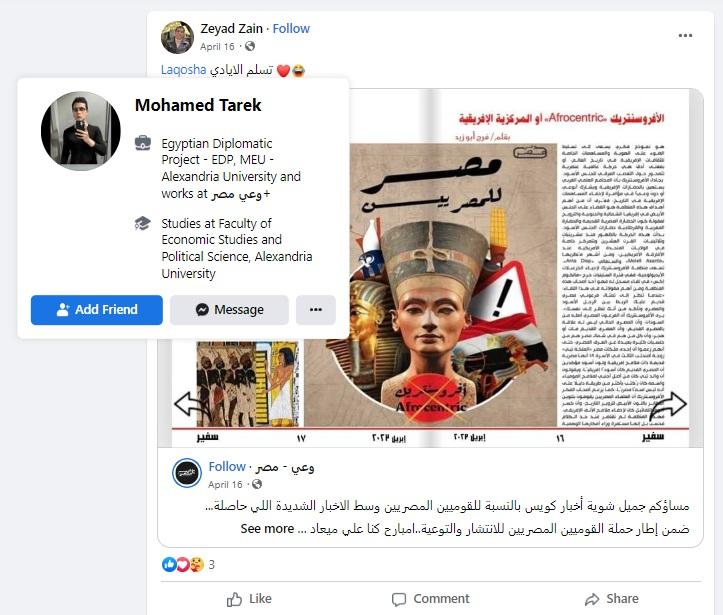
Awareness Egypt enjoys the support of some parliamentarians. As seen below, a post by Ghada Ali, a parliamentarian, a faculty member at Cairo University, and a member of the Youth Coordination of state-affiliated parties. In the post, Ali talked about an event organized by the Coordination, centering on the dangers that Afro-centrism poses to the Egyptian civilization. She claimed that the issue concerns thousands of young Egyptians who are “instinctively proud of their Egyptian identity and have defended it time and again with their bold nationalism in recent times.” She mentioned Zain's account in the post, and thanked him in the comments, for discussing this issue.
The group's page soon prepared a promotional post for the event, expressing gratitude for Ghada Ali's support. It read: “Honestly we, at Awareness Egypt, appreciate this step, and thank the Youth Coordination, and the esteemed parliamentarian Ghada Ali for their support to the nationalist discourse, and their keenness on raising awareness about the dangers of African centrality.”
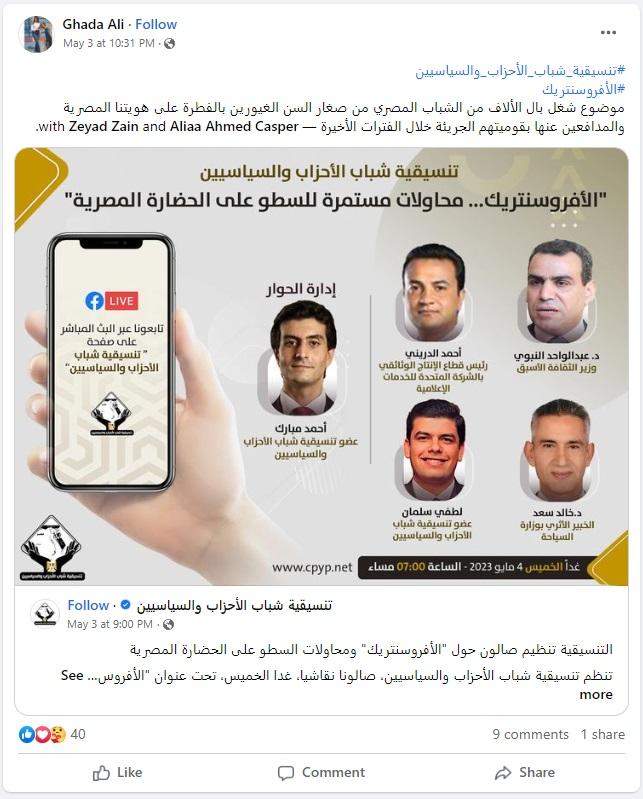
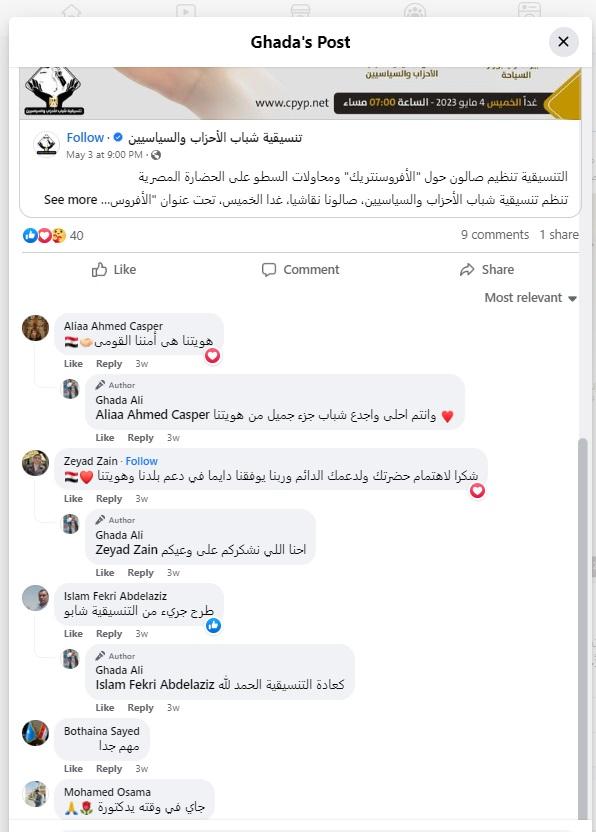
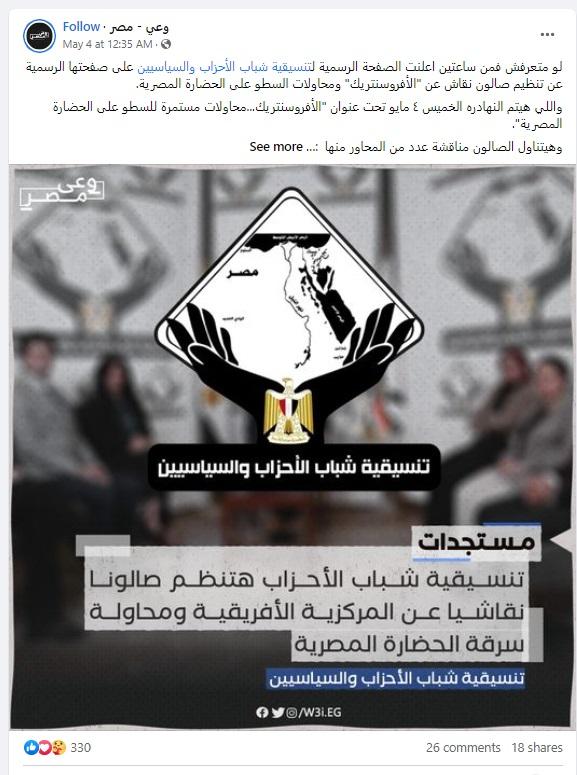
The group does not hide its admiration for right wing extremist movements. It expressed its happiness with the election of the leader of the right-wing "Brothers of Italy" party, Giorgia Meloni, as the Prime Minister of Italy, hailing the rise of far-right movements in Europe and the world.
They don't hesitate to highlight negative news about migrants and refugees worldwide, using it to increase hate speech towards them and amplify negative sentiments about them in Egypt.
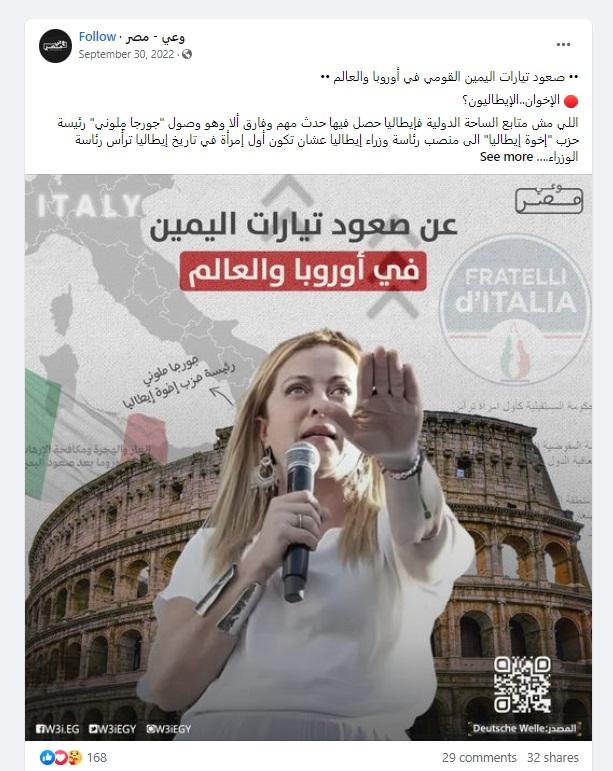
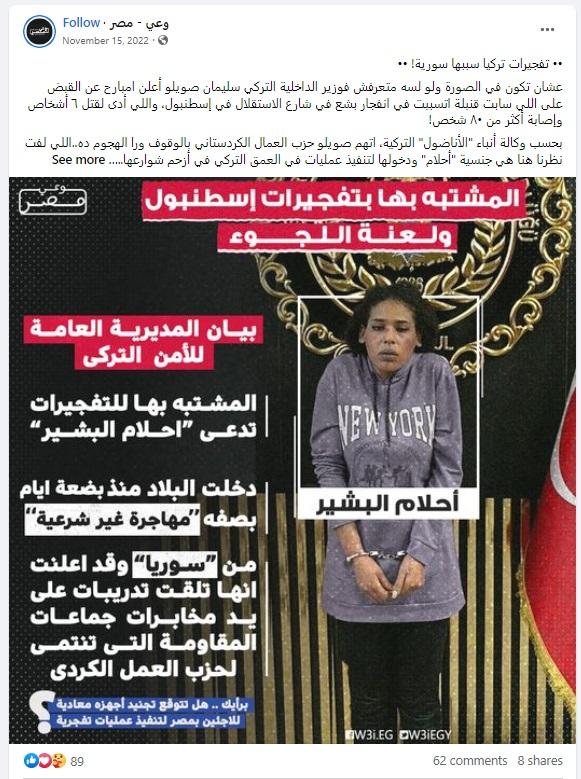
Political campaigns: tarnishing Alaa Abdel Fattah
There are several anti-immigrant groups in Egypt, some of them overlap with the nationalist pages, and others operate independently. What unites them is their support of the president and the government, and their incitement to take harsh measures against immigrants.
With the outbreak of the crisis in Sudan, Awareness Egypt was among the influential groups propagating negative attitudes towards Sudanese refugees. They were critical of the influx of Sudanese fleeing war into Egyptian territory. The group also attacked minorities such as the Amazigh and their heritage.
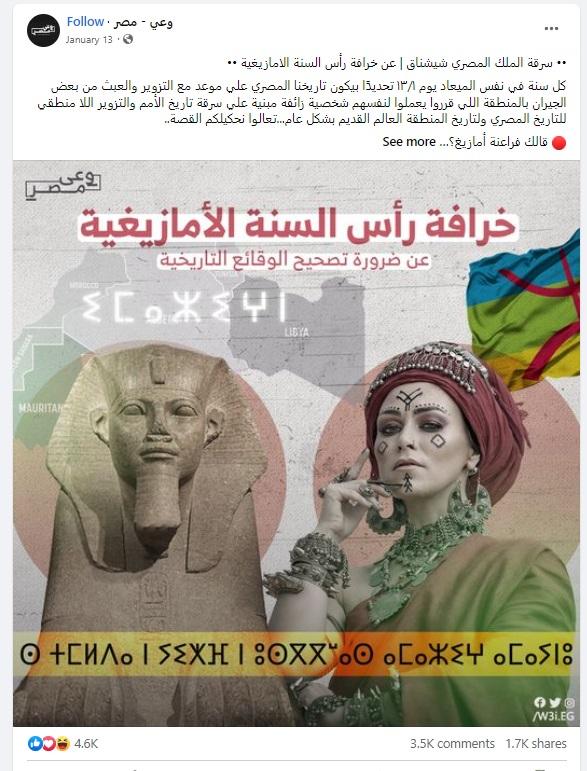
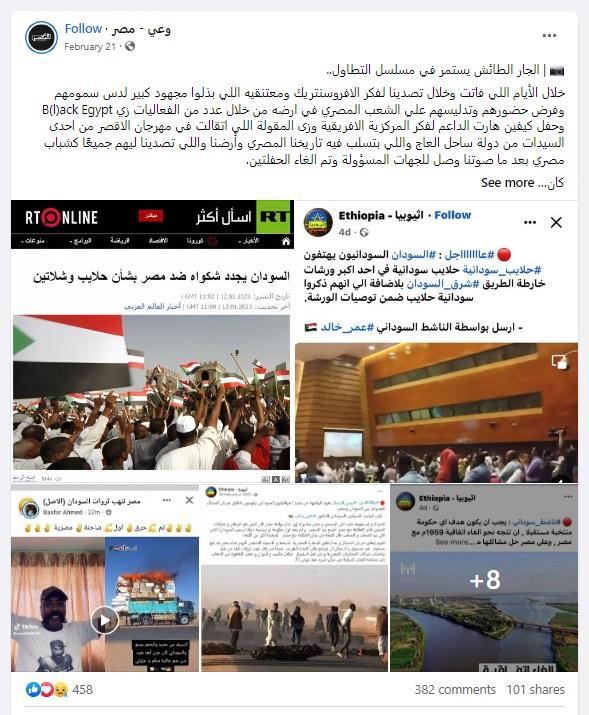
Awareness Egypt expanded its scope. No longer limited to anti-refugee and anti-immigrant campaigns, it extended to include political campaigns that attacked and tarnished the regime’s critics.
The group was among the most prominent in the campaign attacking the political activist Alaa Abdel Fattah, who is currently imprisoned, coinciding with his family's efforts to secure his release capitalizing on the ongoing debates surrounding the case.
The "Support Egypt" campaign, concurrent with the United Nations Climate Summit held in Egypt at the Sharm El Sheikh tourist resort on the Red Sea.
The group posted screenshots of old tweets by Abdel Fattah, with the aim of tarnishing his reputation. It also participated in the hashtag #BritainSupportsTerrorism, along with other coalitions close to the government, such as the Maestro coalition.
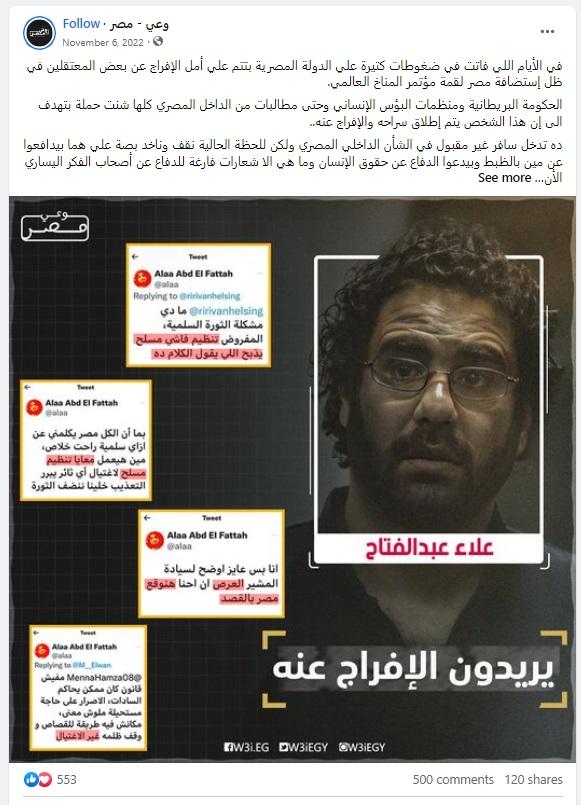
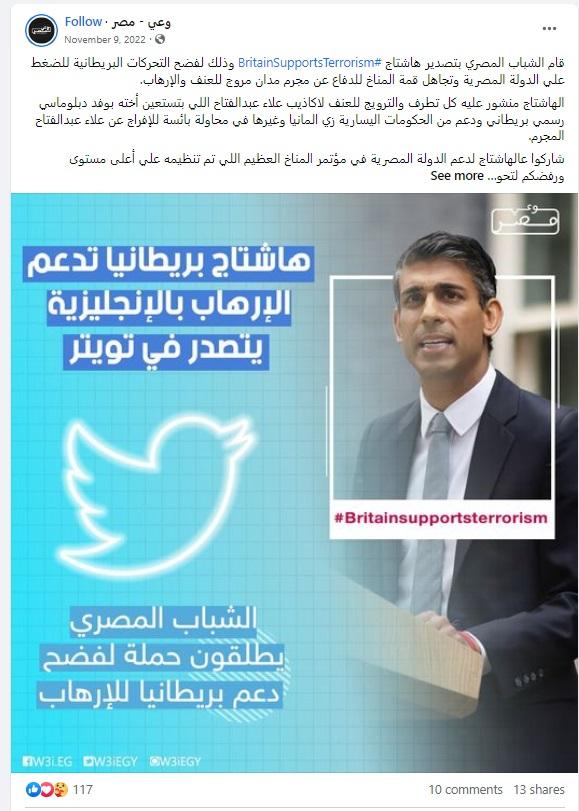
On May 24th, Awareness Egypt posted a video, along the following comment: "It is our pleasure as the Awareness Egypt to announce to you the first educational work resulting from the collaboration with the Egyptian Alliance for Social Media. We present to you 'The Great Argument' about the ideology of Afro-centrism and their attempts to exploit the identity disturbance in Egypt."
Zain reposted the video, tagging Islam Abbas, the coordinator of the Egyptian Alliance for Social Media, adding: "I would like to present to you the first joint awareness work between us Awareness Egypt and the Egyptian Alliance. Professor Islam Abbas." Abbas responded to Zain in the comments, saying: "May God bless all the steps with success. Your effort is significant." He also shared the video on his Facebook page, tagging Zain and ElMorshedy. He wrote: "It was not acceptable for us to watch the falsification of our history silently. This was the responsibility taken by the Egyptian Alliance for Social Media from day one. With strong belief that there are many youths who have the knowledge to debunk this talk, our collaboration with Awareness Egypt to produce the first documentary exposing the lies of Afrocentrism and the unique Egyptian identity took place. Hence, the idea for this episode emerged, which is followed by a series of episodes that will be a motivation for many videos, all volunteered by us and without any support... And we will continue to contribute a part of Egypt's goodness to us. The one supporting us, and as an Egyptian alliance, we are ready to cooperate and assist anyone capable of conveying responses practically and refuting."
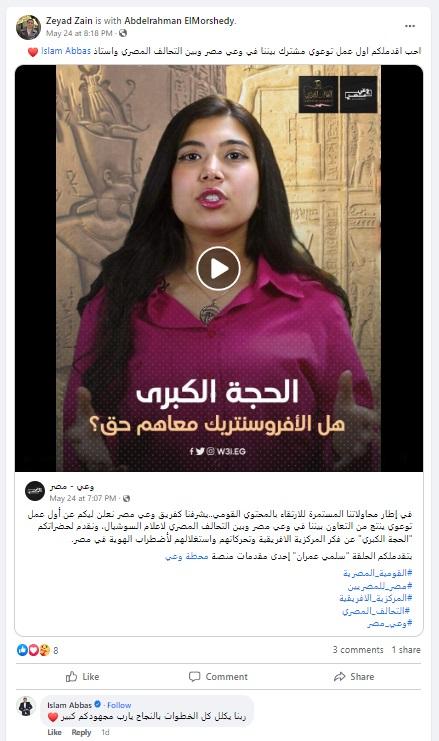
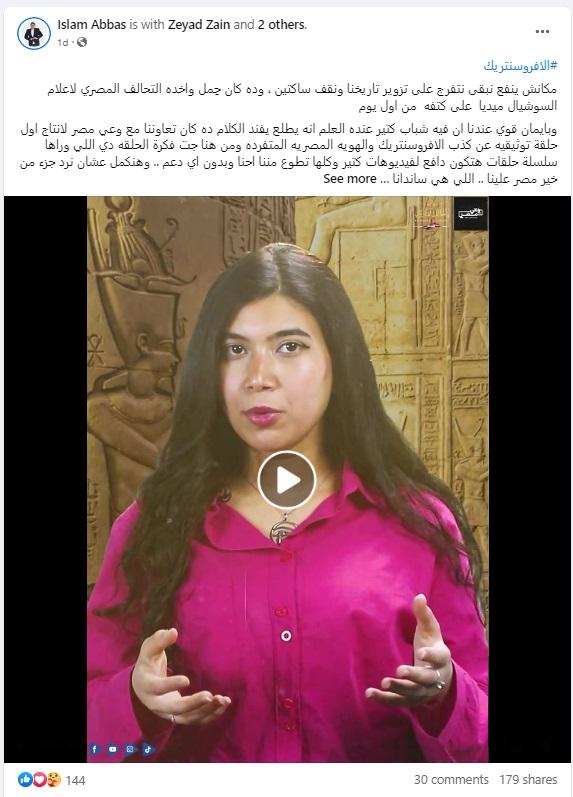
The video was published weeks after Amani Abdelaziz, a leader in the Egyptian Alliance for Social Media, announced in a post on the Alliance’s private group on Facebook that Awareness Egypt had joined the alliance.
The alliance plays a significant role in launching cyber campaigns to promote official policies. Its membership includes key regime supporters, and its leaders have previously appeared in official events attended by President Abdel Fattah El-Sisi.
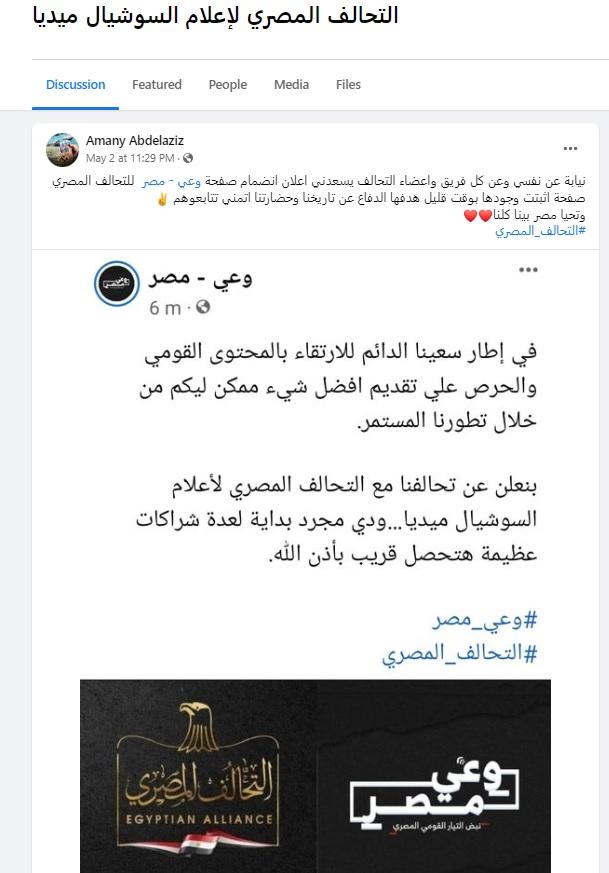
In summary:
- A nationalist group in Egypt, named Awareness Egypt, operates within the sphere of other nationalist groups opposed to immigrants and refugees in Egypt.
- The group was founded by two students living between Alexandria and Cairo.
- The group exchanges publications and coordinates campaigns with other nationalist groups.
- These groups rely on sponsored advertisements on Facebook and Instagram as a means of propaganda, amplifying their anti-immigrant rhetoric.
- The group’s founders seek to engage with government officials and receive support from some parliament members.
- The group participated in political cyber campaigns attacking and distorting critics of the government, such as the campaign against demands for the release of activist Alaa Abdelfattah during the climate summit in Egypt.
- They launch campaigns to silence voices that oppose their positions on immigrant assimilation or the issue of African roots in Egyptian genetics. For example, they participated in a campaign criticizing Monica Hana, a professor at the Faculty of Archaeology and Cultural Heritage at Aswan University.
- The group joined the Egyptian Social Media Alliance, one of the prominent organizers of propaganda campaigns supportive of the president and his government.
